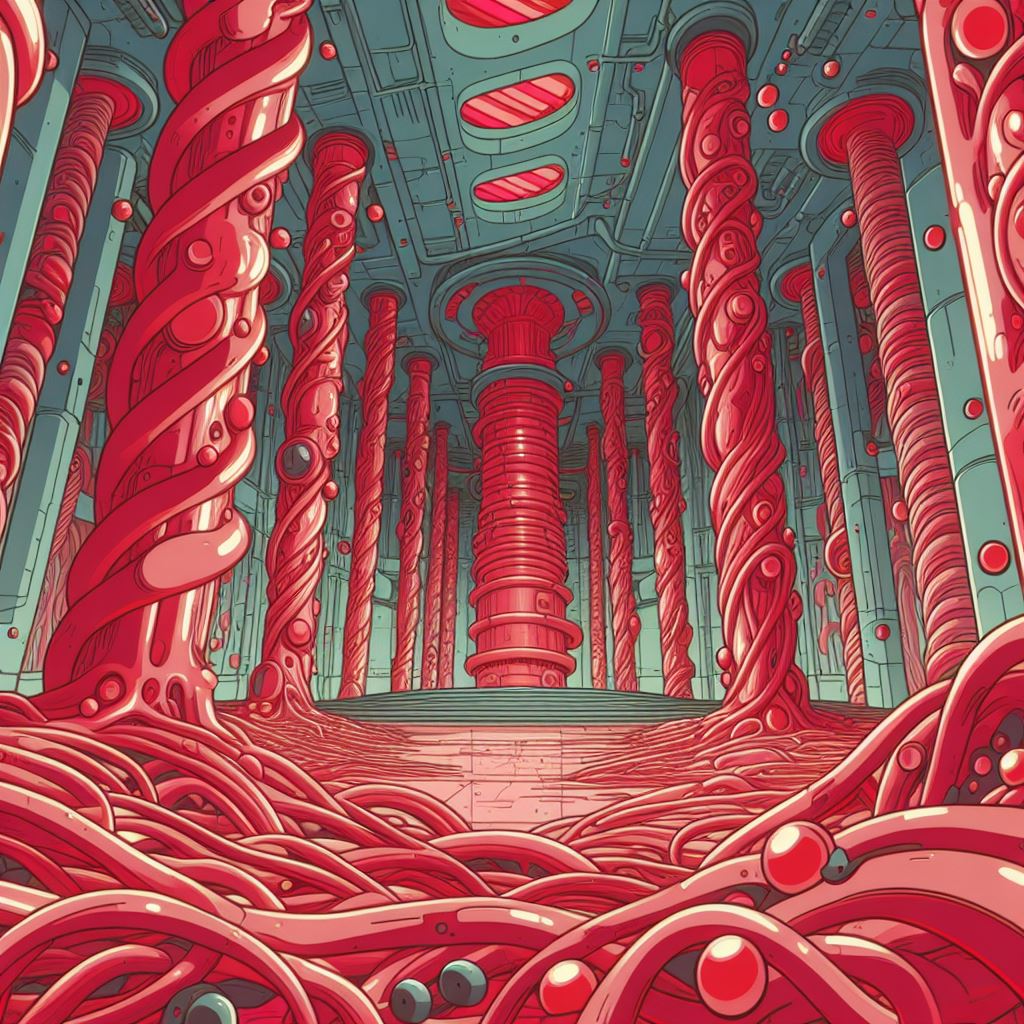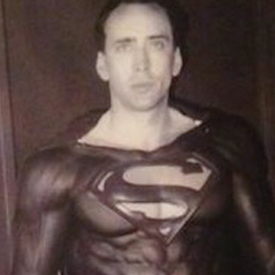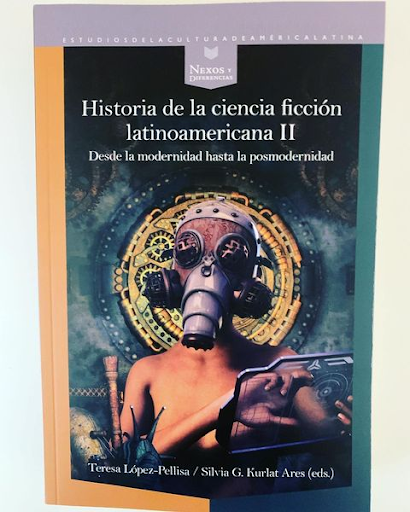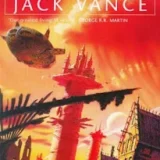
A man, a spaceship…together, working. Could that man dream about being apart from the ship, independent? Can his imagination take him away to reach his goal?
—
The designers of the spaceship, if there ever were any, seemed to share a complete disdain for mental health. Their achievement was nothing else than a sum of tubes and protrusions of a strange, scarlet metal whose malleability equaled that of flesh. None of these features were particularly reassuring to the human mind, which couldn’t help but consider the ship an unfathomable corpse, sealing its internal pores at each exchange of polluted air, or losing some decomposed piece of meat to an inscrutable scavenger for each clutter echoing through the walls. There was something sinister about it, a faint odor of hopelessness merely buried beneath the surface, by habit or by diversion.
Isaac, rather fortunately, was a man dedicated to his job, which usually prevented him from thinking about such fruitless matters. His sole mission was to stay in the watchtower, in front of a control panel filled with glowing blisters and flexible protuberances, in order to react to any signal coming from the ship. When these stimuli reached him — whether originating from the pustules on the board, or from the other outputs in the room — he would immediately react by investigating the issue, locally modifying the chemical environment, or sending maintenance machines to the problematic area. Most of his data was indirect, since his only knowledge of the ship’s difficulties was taken from screeching disturbances ringing in the sound speaker, or pale scars on the mucous dials. He could not walk out of the place, even to verify if he truly lived in a watchtower. As far as he could remember, he was in amnesic solitude since he woke up from torpor, an indefinite number of years ago. He could not even confirm his own name, for no mouth had ever called him “Isaac” in this place.
Yet, Isaac was never bored, since the position offered him quite a few rewards, each duly earned: food, drinks, enjoyment (mostly through the screen above his head), lots of leisure, and a comfortable cocoon no one could trespass upon. His mission, most of all, was the reason behind his existence. He was dependent on the ship, but the ship was blind to its own weaknesses without him. They shared a symbiotic relationship, he thought, and his vigilance was undoubtedly serving the vessel’s higher purpose. Meanwhile, through the screen, he liked learning about the “outside world”, as one may call it: the innumerable eons separating the ship from the rest of mankind; the limitless vacuum beyond the crimson membrane; the many other spacecrafts, and their voiceless watchtowers, perhaps each hiding another technician with whom he would never truly communicate; or the functioning of his surrounding technology, which was comparable, yet unique, on all ships… Similar teachings on the universe were found in his virtual library, his soundtracks, or even in the texture database. Through all these, Isaac discovered this external reality, profoundly fascinated (and thus, entertained) by its wonders. But as his knowledge slowly increased, an unconscious worry began to grow inside his brain: “Where are the ships going?”.
Throughout the years, the question kept coming back, only met with an unbearable silence from the vessel. Isaac would sometimes ask it out loud, yelling a deformed bellow which was only the consequence of constant isolation. Another day, maybe another night, he would simply use the panel to transmit his interrogation to the apathetic screen. At the peak of his fixation, he even used his uncut nails to trace the sentence onto the wall, carving oozing scars into the flabby flesh of the ship. His fingers felt how soft, moist, and warm its texture was. Immediately, a jet of reddish liquid flew on Isaac’s face, a metallic taste infecting his mouth. He was unsure of the consequences, but he continued carving anyway. He tore off the bleeding bits, curving the letters as much as possible, while the little drops of tainted fluid were forming an acid foam on the ground below. When the sentence was complete, with the interrogation mark dug deep, he saw his work as a promising achievement. He felt the ship could not ignore his worries anymore, that as its most faithful servant, he deserved the truth. What he did not expect was the muffled groan that rose from the back of the ship, soon followed by a rapid quake propagating throughout the room. For a moment, Isaac feared the wrath of the ship: the idea that it would get rid of him for his pettiness, for his lack of faith in the grand, unknowable reason behind their journey… Yet, no violent retribution, no ejection into the starless space, no godly voice reprimanding the aggression: only a shiver of silent pain echoing through the ship. A blind and brainless indifference.
Time passed; curiosity kept shifting. The enigma would sometimes tickle him when he would be least anticipating it: once, in a dream he would soon forget, he imagined himself disappearing from the pulpy cathedral, to discover a wondrous landscape of colorful stars, some whose light was cold and dim, while others cast boiling rays on his skin. Around these celestial bodies of perfect proportions, beautiful people — who smelled of lavender and thyme — waved and welcomed his arrival. None of these sights, however, were more impactful than the sudden impression of freedom that had taken hold of him, a pure boundlessness which, the following morning, only made the burden of his task heavier.
Another strange night, a nightmare brought him to leave the ship once more: but this time, the pressure sucked him outside, through the thick, meaty walls into the gruesome void where all stars were extinguished. A brutal absence of sensations, solicitations, or safety. He was alone, abandoned even by the ship he so dearly missed. He tried to scream, but no sound came out of his voiceless throat, nothing to overcome the painful whispers of his own thoughts. He woke up sweaty, daunted by the mute things that crawl under one’s forehead.
The next day, after solving several maintenance issues all over the vessel, Isaac decided to use his best tools to lead the most crucial investigation of his life. The ship did not allow for any inquiry concerning its own destination, but it did not prevent observational research about other spacecrafts. They were still there, somewhere in the black emptiness, similar enough to Isaac’s ship to possess the same purpose. All Isaac had to do was maneuver his instruments toward them and see where they were headed.
He sat in front of the control board, demanding more and more precision from the screen, collecting data on each of these uncanny reflections of his own vessel. He asked the interface to calculate distances, speeds, and coordinates. It took him some time to understand everything: it was not part of his job, after all. One of the first remarkable things he found out was that all the ships were practically following the same road and remaining at the same distances from each other throughout time; yet, the significance of this information still puzzled him.
At one point, though, he noticed an element more baffling than anything else. There was an asymmetrical group of debris and filaments, a little behind the current location of the ship, unevenly dispatched along a trail of corrupted substances. It bore no resemblance to the usual ship ejections or to a space rock. As he looked further into it, Isaac recognized a sinister shape among the remains, worse than most abominations ever to rise in his imagination: a corpse, formerly human, now frigid and bloated in a crooked pose, its eyes burst into two streams of icy blood. Next to it stood a broken panel, a twisted copy of Isaac’s own device.
Isaac felt dizzy, his heart pumping faster as his search was taking a dreadful turn. Until his eyes could not sustain the sight, he looked at every past record he could find. In at least seventeen occurrences, the same cadaver, with its grotesque ocular cavities, had been seen within this same wreckage, almost from this same perspective. Worse than that, as he would go back further into the past, he realized there were many more ships in the group of spacecrafts, all following the same path: several of them disappeared, one after the other, in a progressive decay into disintegration. The blinded carcass was but one of the dead guardians abandoned on the trail. Although he could not count how many spacecrafts in total had gone under this process, Isaac did understand how close and alike their situation was to his.
He realized what it meant. What it implied. Soon, he startled himself by formulating the thought. The ships are not going anywhere. They are moving in circles at an indefinite speed until their guardians fail to sustain themselves and the vessel dies. When he understood what he had just whispered, Isaac refused his own conclusions. He stood up, scratched his eyes, and looked around, unable to chase away the memory of that dead man in the void. He could not help but wonder how many times that corpse had been the mute witness of the ships’ endless journey. How much irony had it beheld, as its alive counterparts remained unaware of their fateful doom? Still in denial, Isaac checked the footage, again and again, the data, the calculations… But none of them disproved any of his original inferences, and soon he found himself facing the facts: he was correct.
For his greatest misfortune, Isaac had wanted to know. He had now the certainty he was nothing more than a meat aggregate, naturally secreted by the spaceship organism to facilitate its survival. Just like the machines he had so often sent for maintenance, he merely served the pointless cause of a selfish, purposeless entity. No destination to reach, no point in doing his job, and nothing sacred to respect in the dumb monster of which he was the parasite.
Almost overwhelmed, Isaac contemplated the possibility of ignoring the truth and continuing his mission. But why would he do so, in front of the absolute vanity of his existence? His duty would never be fulfilled, his master would never reward him in any worthy way. He had never asked to be put there in the first place: why then would he take any satisfaction in such worthless affliction? His miserable life could never be the same after his discovery.
For an instant, he caressed a hopeful dream, like the one where he would find, somewhere on the ship, a few human fetuses, placed in torpor to populate a hypothetical planet upon which the ships would land soon… But there were no planets, no fetuses. The ship had created one humanoid servant to protect itself, and that was all. Whatever initial route there might have been, the circular deviation was now irredeemable.
There was no way out of the ship, no meaningful task to accomplish. Nowhere to go. Isaac would never leave this room for the rest of his existence, as stated by its cloistered architecture. Noticing the carved sentence on the wall, the very question that had plunged him into despair, he started hitting, clawing, and maiming his surroundings with the anger of a man stripped away from everything else. The vessel shuddered; a faint rumble buzzed through the bloody sores. And with the stifling silence coming back, Isaac finally cried his last drops of hope.
The man — if he ever was one — laid down in the fetal position, closing his eyes, calming his breath. He did not react to his environment, to the food emerging, or to the alarm signals ringing. He slept and dreamt of the decaying corpse he was bound to become. He dreamt of a long-awaited planet, whose trajectory would one day meet the spaceships’ path, and upon which they would undoubtedly crash, to vanish from reality. And as his room was falling apart on all sides, among the chaos of the sirens, Isaac surprised himself with the comforting thought that the ship would soon follow him into the frozen void.









